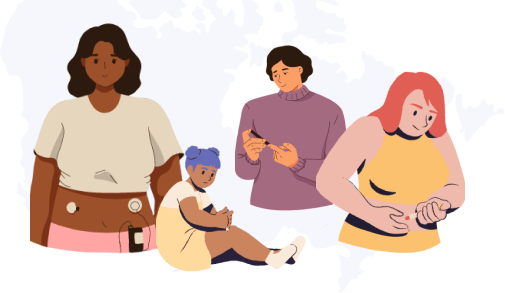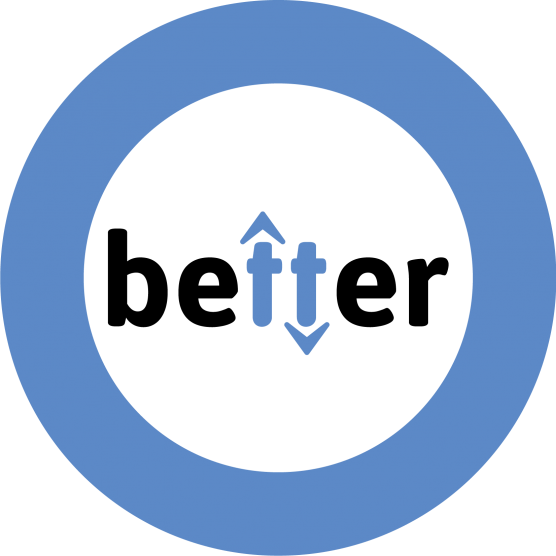Hypoglycemia (low blood sugar levels) is the most dreaded side effect of insulin for people with type 1 diabetes (T1D). Symptoms such as sweating, shaking and palpitations can make the person aware that their blood sugar is low and that they need to eat carbs (sugar) to bring it back up.
If a person is unaware that they have hypoglycemia (e.g., they don’t feel the first symptoms) or if they don’t treat it in time (e.g., no access to carbs), hypoglycemia may become severe. When this happens, the lack of glucose in the brain causes severe symptoms such as difficulty swallowing, confusion, drowsiness and loss of consciousness, and the person is unable to take carbs on their own. Someone must then step in very quickly to help bring blood sugar levels back up (e.g., by administering glucagon) and avoid hypoglycemic coma.
Not only can severe hypoglycemia have immediate, significant impacts (e.g., road accident, workplace injury), but it also affects the quality of life of T1D patients and their loved ones.
Stories and confidences
A recent study has collected the stories and confidences of people with T1D and their loved ones (e.g., spouse, parent) about their experience with severe hypoglycemia.
Here are the key points:
- Loved ones do their best to help.
The study has shown that loved ones were willing to help with any hypoglycemic episode—severe or not—, mainly by bringing carbs. But some people with T1D are reluctant to ask for help; they underestimate the severity of hypoglycemia and its consequences, and they don’t want to be a burden.
Loved ones said they felt that severe hypoglycemia was scary, nerve-wracking, alarming and dangerous, and they felt powerless and insufficiently prepared.
Nearly one in three participants had never heard of glucagon, and some had false assumptions about its use and effects.
- A nerve-wracking moment
All participants described severe hypoglycemia as a nerve-wracking moment where it’s difficult to make decisions and know what to do, especially if they don’t have a pre-established plan.
- Self-learning
People with T1D and their loved ones said that they were never told what to do in case of severe hypoglycemia, so they had to find out on their own. They also said they would have liked to have access to more resources (e.g., discussion with their healthcare team, training, glucagon prescription) before they had to face this situation.
- A lack of training and discussion
Participants said that training on the risk of severe hypoglycemia was often discussed with healthcare teams when they started on insulin, but that it was rarely mentioned afterwards.
In fact, few people with T1D discuss their hypoglycemic episodes during medical appointments, except for those they consider serious (e.g., emergency, hospitalization).
Always be prepared!
Over time, patients develop habits and might underestimate the risk of severe hypoglycemia. But it’s important to remember that circumstances are ever-changing and severe hypoglycemia can occur at just about anytime, so you have to be prepared.
Even though severe hypoglycemia is relatively rare, people with T1D should always carry nasal or injectable glucagon, and make sure that their friends, family and colleagues know how to use it, if necessary. Several studies have shown that in times of crisis (e.g., severe hypoglycemia episode), nasal glucagon is the easiest treatment to administer. Glucagon has been covered by the RAMQ since February 2, 2022.
People with T1D should always have this treatment on hand, even when the risk seems low. It’s no different than cars having airbags even though car accidents are rare, or people with allergies always carrying their EpiPen.
As for healthcare teams, they should proactively discuss hypoglycemia with their patients, offer training on treatments and resources for severe hypoglycemia, and provide regular reminders to prevent the risk of severe hypoglycemia and help patients with T1D and their loved ones know what to do if this happens.
References:
- Rossi, Maria Chiara et al. “Impact of severe and symptomatic hypoglycemia on quality of life and fear of hypoglycemia in type 1 and type 2 diabetes. Results of the Hypos-1 observational study.” Nutrition, metabolism, and cardiovascular diseases : NMCD vol. 29,7 (2019): 736-743. doi:10.1016/j.numecd.2019.04.009
- Stuckey, HL, Desai, U, King, SB, et al. The experience of a severe hypoglycaemic event from the perspective of people with diabetes and their caregivers: “What am I going to do?”. Diabet Med. 2021; 00:e14745. doi:10.1111/dme.14745

Would you like to find out more and explore this topic with your loved ones?
Visit the Support training platform to view the following fact sheets that were developed by the BETTER team and a group of patient partners:
You can print out these sheets and keep them with your glucagon should you need them.

Be a part of the research!
Dr. Claudia Gagnon’s research lab at the Centre de recherche du CHU de Québec (CHUL site) – Université Laval is looking for parents or guardians of children with T1D to take part in a research project. Participants will be asked to simulate the administration of nasal and injectable glucagon after watching short videos and to provide feedback afterwards in an interview.
Participants will receive financial compensation.
Participate in the BETTER registry!

First registry of people living with T1D in Canada.
Learn More








